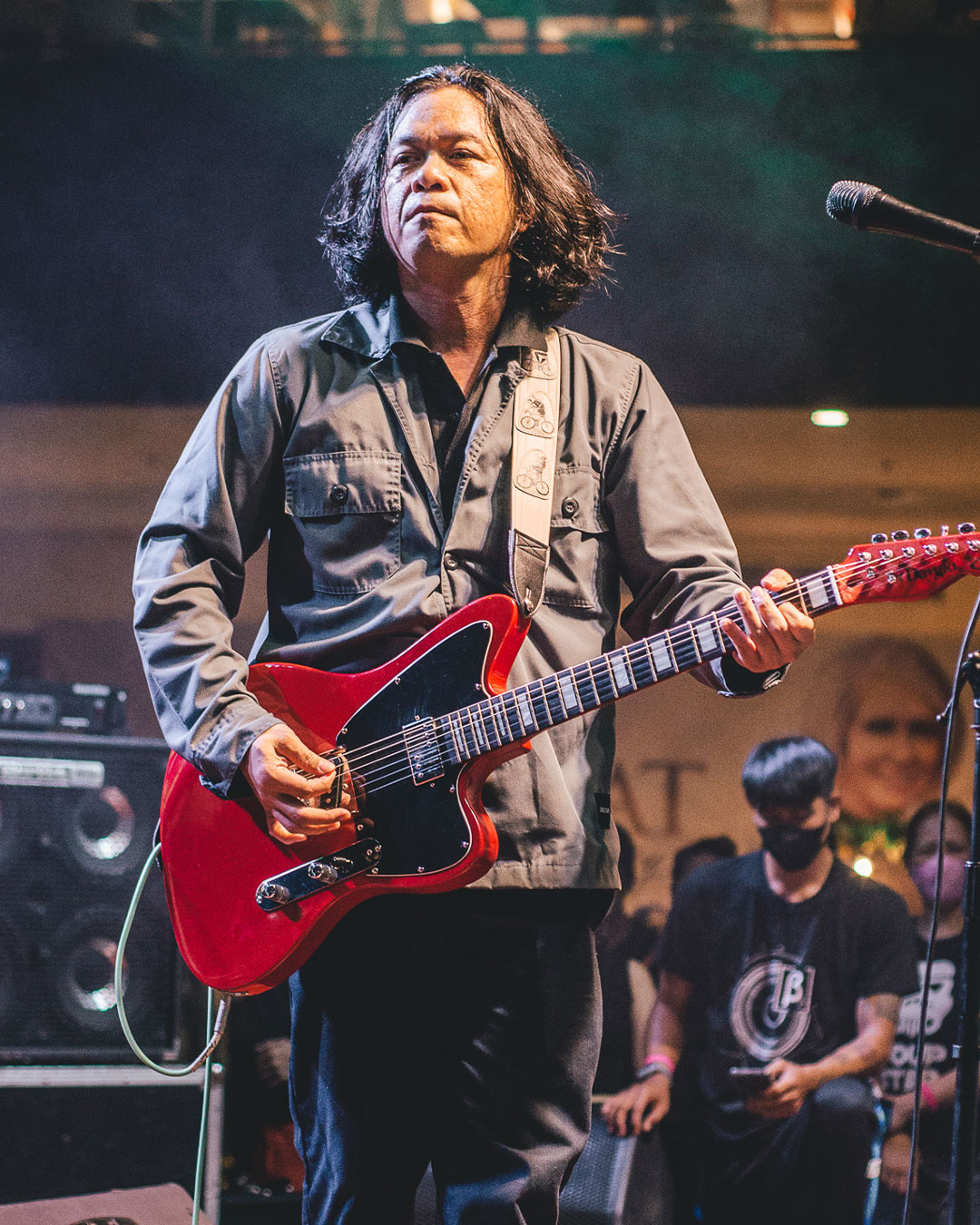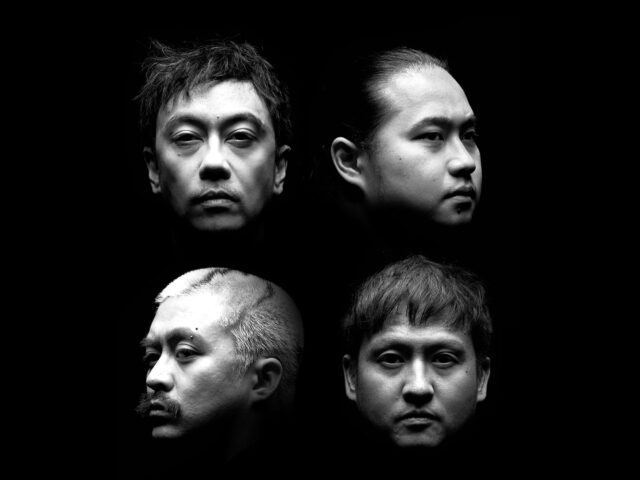Sandwich’s expansive and richly storied history has seen the twists and turns of the times: from cassettes to Spotify, nu metal to frenzied dance punk, and rock and roll riots to — well, still rock and roll, but with the wisdom that comes from being a band for twenty-five years. After all of the awards and hits that have made them a cornerstone of Philippine pop culture, it’s clear how the band remains grateful to be able to do what they love, and being able to pay that forward.
The band’s original lineup in 1998 comprised Raymund Marasigan and Marc Abaya on vocals and guitars, Diego Castillo on guitar, Myrene Academia on bass, and Mike Dizon on drums. The band was — and still is — essentially six degrees of separation away from every local band: Marasigan was the drummer of the Eraserheads; Dizon was the drummer of Teeth; Abaya was in Shirley Beans (which included future members of Dicta License and Kjwan); and Academia and Castillo were radio hosts on NU107 and bandmates in The Aga Muhlach Experience. In 2005, Abaya left the band and Mong Alcaraz joined on guitar.

Raymund Marasigan (of Sandwich) photographed by Ronnie A. Luzentales Jr.
Abaya’s vocals mark the band’s first three albums Grip Stand Throw (1999), 4-Track Mind (2001), and some of Thanks to the Moon’s Gravitational Pull (2003). His onstage presence was larger than life, in a way — cradling the mic while the rest of the band jumped around the stage as if the floor was lava.
Despite each Sandwich member being in other bands running the gig circuit, along with the inevitable comparisons that come with the fact, their music attracted a crowd of its own. Sandwich’s first two albums eclectically blended what was on the radio at the turn of the century, blurring boundaries with different genres coexisting: the stadium rock of “Butterfly Carnival,” the lo-fi hip-hop of “Grip Stand Throw,” nu metal on “Food for the Soul,” the indie rock ballad “Hair Pin,” and even a jungle-metal hybrid in “Art To Di Too.” At present, it’s widely understood that genres aren’t categories for bands to box themselves into, and Sandwich’s experimentations made them brave for their time.
“Almost every fan of music has their own version of ‘Betamax’ — each to their own autobiographical love letters to rock and roll.”
The music video of “2 Trick Pony,” beginning with a DJ scratching with neon green vinyl to a crowd dressed in halter tops, statement shirts, and wraparound glasses, captured youth culture on the brink of change. Shortly after the album’s release, Abaya bowed out of Sandwich. The album’s other hits “Masilungan” (Sheltered) and “Nahuhulog” (Falling) had Marasigan on the mic onwards, prowling and pogo-jumping through the twists and turns of their material.
In 2005, Sandwich cemented its lineup by pulling in Chicosci’s Alcaraz on guitars for Five on the Floor (2006). The interplay of his jagged, mercurial guitarwork playing langit lupa with Castillo’s searing, propulsive post-punk leanings would become one of the signature dynamics of the band. The band’s pop culture savvy emerged in their Filipino songs like “DVDx” and “Sugod” (Rush), sharply honing in on shared experiences like saving up to see your favorite band or digging for gold in a ragbag shelf of pirated CDs. “Marikina,” in particular, was a homage to Marasigan’s neighborhood, name-dropping the musicians who characterized its scene.

Sandwich photographed by Niko Villegas.
<S> Marks the Spot (2008) marks Sandwich’s tenth year, and was borne out of the band’s touring experiences at the time, which included shows all over the country and abroad. “Procrastinator” and “Ang Pagbabalik” (The Comeback) are veritable crowd anthems — with the latter’s chorus being a wieldy tongue twister — shelling out riffs that have now become iconic.
Contra Tiempo (2011) is the band’s first album where all the songs are in Filipino. “Putik” (Mud) deals with the aftermath of Typhoon Ondoy in 2009, dealing with a collective tragedy through a personal narrative of sifting through a household upended by a flood, complete with a dissonant guitar surging into a breakdown. The band turns seemingly simple gestures into allegories for shared sentiments, both in terms of lyrics and sonic form. It feels real because it’s drawn from lived experience.

Myrene Academia (of Sandwich) photographed by Ronnie A. Luzentales Jr.
With fifteen years of relentless gigging experience, the band recorded Fat Salt and Flame (2014) entirely live in a fifteen-day studio marathon. The eponymous track is a slow, mesmerizing buildup into a feedback-laden guitar freakout, telling an entire story without a vocal line. Academia takes center stage on “New Romancer,” a muted, introspective track that is a portent of the sample-based approach to arrangement that the band would explore down the line. By refraining from studio wizardry, the record highlighted Dizon’s command of rhythm that steered the band with precision while unleashing their primal edge.
Debris (2015) holds one of Sandwich’s most poignant songs: “Balintawak,” referencing the historical moment when Filipinos initiated their revolt against the Spanish Empire. Uneasy arpeggios captured the collective uncertainty of the Philippines in the mid-2010’s, weary but still unwilling to give up hope. While Sandwich has moshpit-igniting songs in spades, some of their best songcraft is in their somber works.
In 2018, the band celebrated their 20th anniversary with a surprise release Space/Spase, which revisited their popular songs in a very Sandwich way: a delightfully surprising collection of curveball remixes that break the cliche of the “best of” album.
When the COVID-19 pandemic of 2020 halted live shows, the band took the pause as an opportunity to take a different approach to songwriting. On their EP No Goodbyes (2020), which collects their songs from 2020 onwards, the band takes a sample-based approach to making a song. Writing songs in a studio may be a different process different from splicing, looping, and collaging sounds, but these are just the tools. Their fundamental musical sensibility still holds true, whatever instrument or technology is at their fingertips.
At 25 years in their career, Sandwich have outlasted many of their contemporaries. They’ve seen eras come and go. The era of radio has given way to streaming. Trends and technologies have come and gone, while others have taken their place. New generations of musicians step up, bringing fresh sounds to the local music landscape.

Diego Castillo (of Sandwich) photographed by Ronnie A. Luzentales Jr.
Sandwich are among the most experienced veterans of the music scene, but they’ve also championed upcoming acts. Even if they’ve played sold-out shows around the Philippines and abroad, you can still find them regularly organizing shows with Imago under their production Play4Serve. These gigs are in intimate music venues, which gives them room to experiment and road-test new music. They’ve been inviting local acts that are on the band’s radar, sharing the spotlight with new acts. Each of the band’s members is generous with what they know about music, in addition to tips about life at large: scenic bike routes, hidden food gems, movie recommendations, and myriad other things under the sun.
Marasigan calls playing music “the gift,” and that goes both ways. Music has given much to Sandwich, and they’ve given back. Plenty of teenagers have meticulously filed through every single name mentioned in the anecdotal history of “Betamax,” from Pepe Smith to Club Dredd, which is much easier now with the internet. That one song alone may have very well become the catalyst for people to dive deep into the local music scene, or even pick up an instrument. Almost every fan of music has their own version of “Betamax” — each to their own autobiographical love letters to rock and roll.
In a way, that’s what the band has been doing across their discography all along, across all of the eras they’ve had. Sandwich are the sound of what it’s like to be profoundly into music like your life depends on it. A song can still change your life — our lives, actually — and how it sparks synapses that lead toward the pulse of what keeps us together. Sandwich know that well.
This cover story is part of Billboard Philippines’ Pinoy Rock series, where we define the sound the Filipino rock scene through 10 of the most influential bands in the country. Read more of the series below.




